
generative_ai_with_langchain
Build large language model (LLM) apps with Python, ChatGPT and other models. This is the companion repository for the book on generative AI with LangChain.
Stars: 568
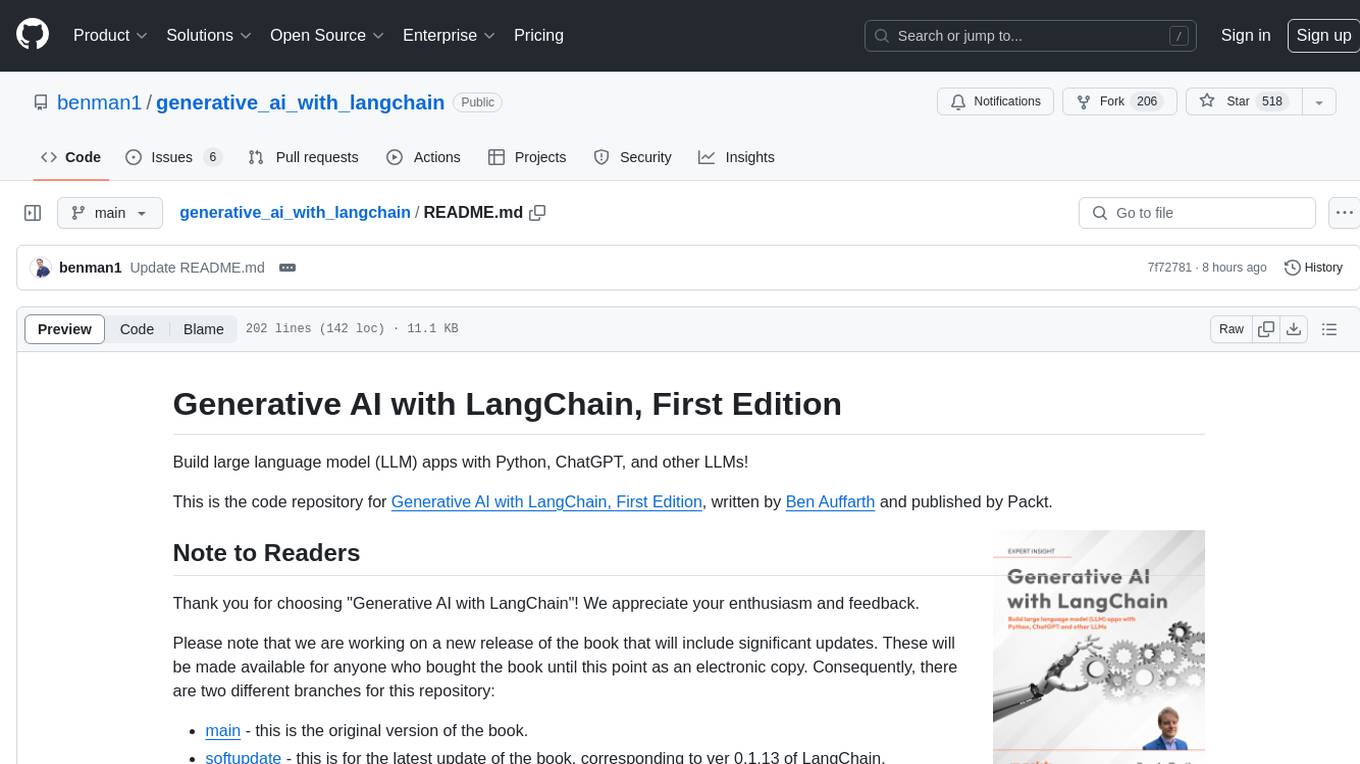
Generative AI with LangChain is a code repository for building large language model (LLM) apps with Python, ChatGPT, and other LLMs. The repository provides code examples, instructions, and configurations for creating generative AI applications using the LangChain framework. It covers topics such as setting up the development environment, installing dependencies with Conda or Pip, using Docker for environment setup, and setting API keys securely. The repository also emphasizes stability, code updates, and user engagement through issue reporting and feedback. It aims to empower users to leverage generative AI technologies for tasks like building chatbots, question-answering systems, software development aids, and data analysis applications.
README:
Build large language model (LLM) apps with Python, ChatGPT, and other LLMs!
This is the code repository for Generative AI with LangChain, First Edition, written by Ben Auffarth and published by Packt.

Thank you for choosing "Generative AI with LangChain"! We appreciate your enthusiasm and feedback.
Please note that we are working on a new release of the book that will include significant updates. These will be made available for anyone who bought the book until this point as an electronic copy. Consequently, there are two different branches for this repository:
- main - this is the original version of the book.
- softupdate - this is for the latest update of the book, corresponding to ver 0.1.13 of LangChain.
Please refer to the version that you are interested in or that corresponds to your version of the book.
If you have already purchased an up-to-date print or Kindle version of this book, you can get a DRM-free PDF version at no cost. Simply click on the link to claim your free PDF.
Free-Ebook
We also provide a PDF file that has color images of the screenshots/diagrams used in this book at GraphicBundle
Code Updates: Our commitment is to provide you with stable and valuable code examples. While LangChain is known for frequent updates, we understand the importance of aligning our code with the latest changes. The companion repository is regularly updated to harmonize with LangChain developments.
Expect Stability: For stability and usability, the repository might not match every minor LangChain update. We aim for consistency and reliability to ensure a seamless experience for our readers.
How to Reach Us: Encountering issues or have suggestions? Please don't hesitate to open an issue, and we'll promptly address it. Your feedback is invaluable, and we're here to support you in your journey with LangChain. Thank you for your understanding and happy coding!
You can get more engaged on the discord server for more latest updates and discussions in the community at Discord
This is the companion repository for the book. Here are a few instructions that help getting set up. Please also see chapter 3.
All chapters rely on Python.
| Chapter | Software required | Link to the software | Hardware specifications | OS required |
|---|---|---|---|---|
| All chapters | Python 3.11 | https://www.python.org/downloads/ | Should work on any recent computer | Windows, MacOS, Linux (any), macOS, Windows |
Please note that Python 3.12 might not work (see #11).
You can install your local environment with conda (recommended) or pip. The environment configurations for conda and pip are provided. Please note that if you choose pip as you installation tool, you might need additional tweaking.
If you have any problems with the environment, please raise an issue, where you show the error you got. If you feel confident, please go ahead and create a pull request.
For pip and poetry, make sure you install pandoc in your system. On MacOS use brew:
brew install pandocOn Ubuntu or Debian linux, use apt:
sudo apt-get install pandocOn Windows, you can use an installer.
This is the recommended method for installing dependencies. Please make sure you have anaconda installed.
First create the environment for the book that contains all the dependencies:
conda env create --file langchain_ai.yaml --forceThe conda environment is called langchain_ai. You can activate it as follows:
conda activate langchain_ai Pip is the default dependency management tool in Python. With pip, you should be able to install all the libraries from the requirements file:
pip install -r requirements.txtIf you are working with a slow internet connection, you might see a timeout with pip (this can also happen with conda and pip). As a workaround, you can increase the timeout setting like this:
export PIP_DEFAULT_TIMEOUT=100There's a docker file for the environment as well. It uses the docker environment and starts an ipython notebook. To use it, first build it, and then run it:
docker build -t langchain_ai .
docker run -d -p 8888:8888 langchain_aiYou should be able to find the notebook in your browser at http://localhost:8888.
Make sure you have poetry installed. On Linux and MacOS, you should be able to use the requirements file:
poetry install --no-rootThis should take the pyproject.toml file and install all dependencies.
Following best practices regarding safety, I am not committing my credentials to GitHub. You might see import statements mentioning a config.py file, which is not included in the repository. This module has a method set_environment() that sets all the keys as environment variables like this:
Example config.py:
import os
def set_environment():
os.environ['OPENAI_API_KEY']='your-api-key-here'Obviously, you'd put your API credentials here. Depending on the integration (Openai, Azure, etc) you need to add the corresponding API keys. The OpenAI API keys are the most often used across all the code.
You can find more details about API credentials and setup in chapter 3 of the book Generative AI with LangChain.
If you find anything amiss with the notebooks or dependencies, please feel free to create a pull request.
If you want to change the conda dependency specification (the yaml file), you can test it like this:
conda env create --file langchain_ai.yaml --forceYou can update the pip requirements like this:
pip freeze > requirements.txtPlease make sure that you keep these two ways of maintaining dependencies in sync.
Then make sure, you test the notebooks in the new environment to see that they run.
I've included a Makefile that includes instructions for validation with flake8, mypy, and other tools. I have run mypy like this:
make typecheckTo run the code validation in ruff, please run
ruff check .Create generative AI apps with LangChain.
ChatGPT and the GPT models by OpenAI have brought about a revolution not only in how we write and research but also in how we can process information. This book discusses the functioning, capabilities, and limitations of LLMs underlying chat systems, including ChatGPT and Bard. It also demonstrates, in a series of practical examples, how to use the LangChain framework to build production-ready and responsive LLM applications for tasks ranging from customer support to software development assistance and data analysis – illustrating the expansive utility of LLMs in real-world applications.
Unlock the full potential of LLMs within your projects as you navigate through guidance on fine-tuning, prompt engineering, and best practices for deployment and monitoring in production environments. Whether you're building creative writing tools, developing sophisticated chatbots, or crafting cutting-edge software development aids, this book will be your roadmap to mastering the transformative power of generative AI with confidence and creativity.
- Understand LLMs, their strengths and limitations
- Grasp generative AI fundamentals and industry trends
- Create LLM apps with LangChain like question-answering systems and chatbots
- Understand transformer models and attention mechanisms
- Automate data analysis and visualization using pandas and Python
- Grasp prompt engineering to improve performance
- Fine-tune LLMs and get to know the tools to unleash their power
- Deploy LLMs as a service with LangChain and apply evaluation strategies
- Privately interact with documents using open-source LLMs to prevent data leaks
This book is a comprehensive introduction to LLMs and LangChain, demystifying the basic mechanics of LangChain, its functionalities, and the myriad of applications it can be integrated into.
In the following table, you can find links to the files (directories) in this repository, and to notebook execution platforms such as Google Colab and Kaggle/Gradient Notebooks.
| Chapter | Files | Colab | Kaggle | Gradient |
|---|---|---|---|---|
| 01, What Is Generative AI | ||||
| 02, LangChain for LLM Apps | ||||
| 03, Getting Started with LangChain | ||||
| 04, Building Capable Assistants | ||||
| 05, Building a Chatbot like ChatGPT | ||||
| 06, Developing Software with Generative AI | ||||
| 07, LLMs for Data Science | ||||
| 08, Customizing LLMs and Their Output | ||||
| 09, Generative AI in Production | ||||
| 10, The Future of Generative Models |
If you feel this book is for you, get your copy today!
Ben Auffarth A seasoned data science leader with a background and Ph.D. in computational neuroscience. Ben has analyzed terabytes of data, simulated brain activity on supercomputers with up to 64k cores, designed and conducted wet lab experiments, built production systems processing underwriting applications, and trained neural networks on millions of documents. He’s the author of the books Machine Learning for Time Series and Artificial Intelligence with Python Cookbook. He now works in insurance at Hastings Direct.
For Tasks:
Click tags to check more tools for each tasksFor Jobs:
Alternative AI tools for generative_ai_with_langchain
Similar Open Source Tools

generative_ai_with_langchain
Generative AI with LangChain is a code repository for building large language model (LLM) apps with Python, ChatGPT, and other LLMs. The repository provides code examples, instructions, and configurations for creating generative AI applications using the LangChain framework. It covers topics such as setting up the development environment, installing dependencies with Conda or Pip, using Docker for environment setup, and setting API keys securely. The repository also emphasizes stability, code updates, and user engagement through issue reporting and feedback. It aims to empower users to leverage generative AI technologies for tasks like building chatbots, question-answering systems, software development aids, and data analysis applications.
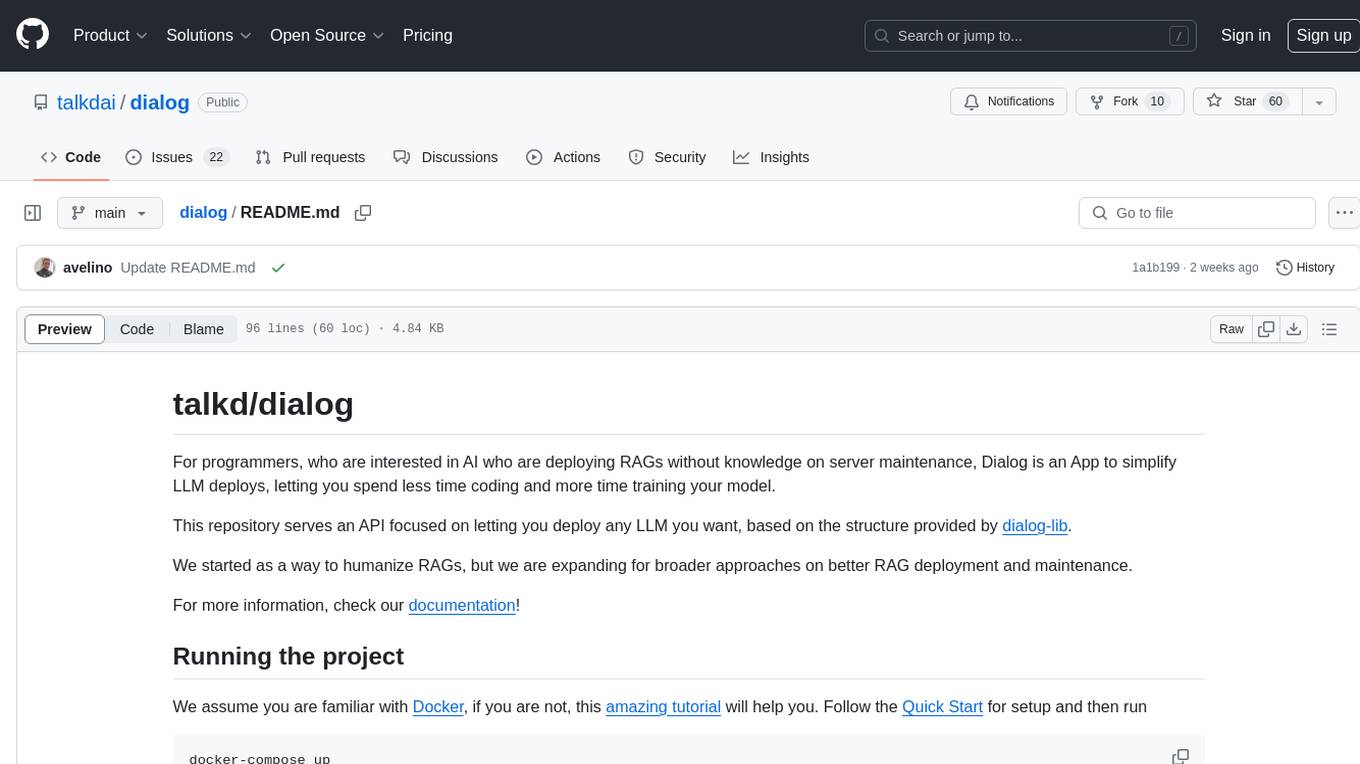
dialog
Dialog is an API-focused tool designed to simplify the deployment of Large Language Models (LLMs) for programmers interested in AI. It allows users to deploy any LLM based on the structure provided by dialog-lib, enabling them to spend less time coding and more time training their models. The tool aims to humanize Retrieval-Augmented Generative Models (RAGs) and offers features for better RAG deployment and maintenance. Dialog requires a knowledge base in CSV format and a prompt configuration in TOML format to function effectively. It provides functionalities for loading data into the database, processing conversations, and connecting to the LLM, with options to customize prompts and parameters. The tool also requires specific environment variables for setup and configuration.
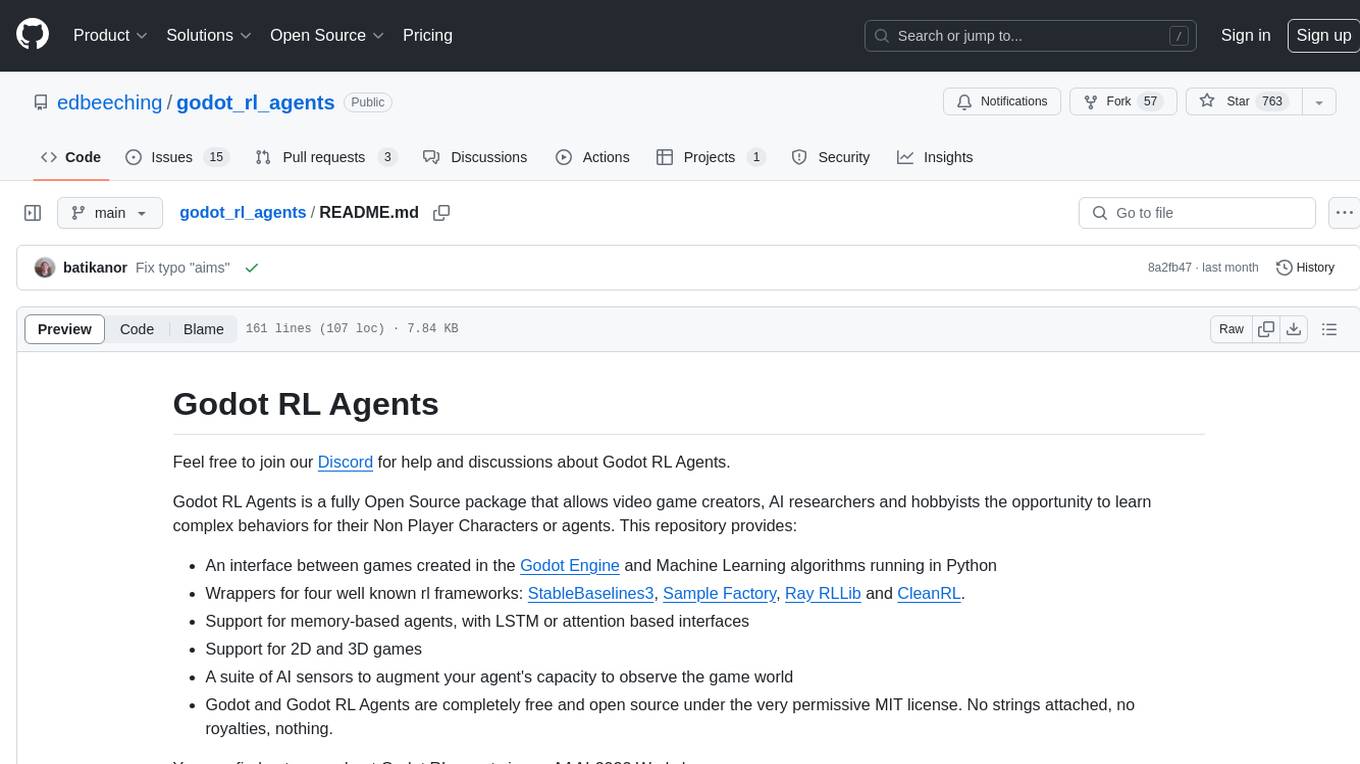
godot_rl_agents
Godot RL Agents is an open-source package that facilitates the integration of Machine Learning algorithms with games created in the Godot Engine. It provides interfaces for popular RL frameworks, support for memory-based agents, 2D and 3D games, AI sensors, and is licensed under MIT. Users can train agents in the Godot editor, create custom environments, export trained agents in ONNX format, and utilize advanced features like different RL training frameworks.
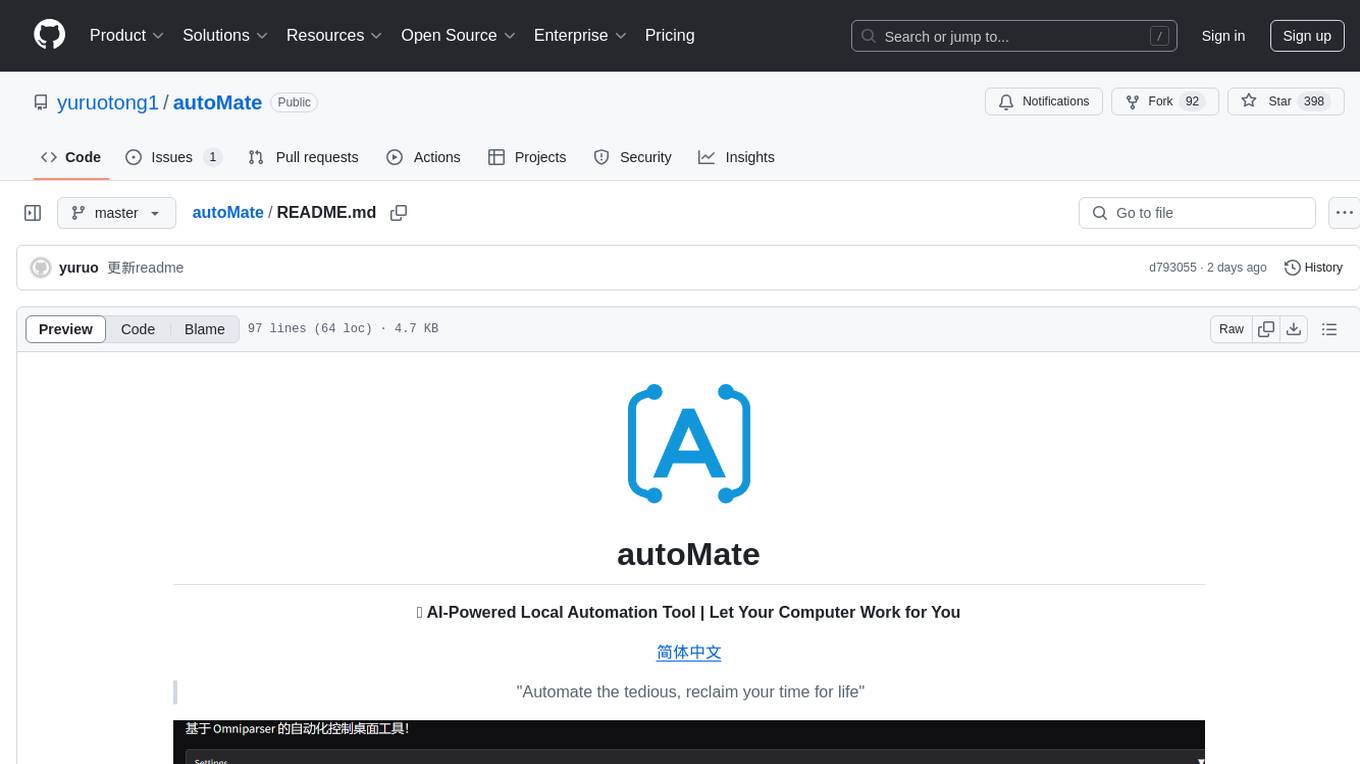
autoMate
autoMate is an AI-powered local automation tool designed to help users automate repetitive tasks and reclaim their time. It leverages AI and RPA technology to operate computer interfaces, understand screen content, make autonomous decisions, and support local deployment for data security. With natural language task descriptions, users can easily automate complex workflows without the need for programming knowledge. The tool aims to transform work by freeing users from mundane activities and allowing them to focus on tasks that truly create value, enhancing efficiency and liberating creativity.

GlaDOS
This project aims to create a real-life version of GLaDOS, an aware, interactive, and embodied AI entity. It involves training a voice generator, developing a 'Personality Core,' implementing a memory system, providing vision capabilities, creating 3D-printable parts, and designing an animatronics system. The software architecture focuses on low-latency voice interactions, utilizing a circular buffer for data recording, text streaming for quick transcription, and a text-to-speech system. The project also emphasizes minimal dependencies for running on constrained hardware. The hardware system includes servo- and stepper-motors, 3D-printable parts for GLaDOS's body, animations for expression, and a vision system for tracking and interaction. Installation instructions cover setting up the TTS engine, required Python packages, compiling llama.cpp, installing an inference backend, and voice recognition setup. GLaDOS can be run using 'python glados.py' and tested using 'demo.ipynb'.
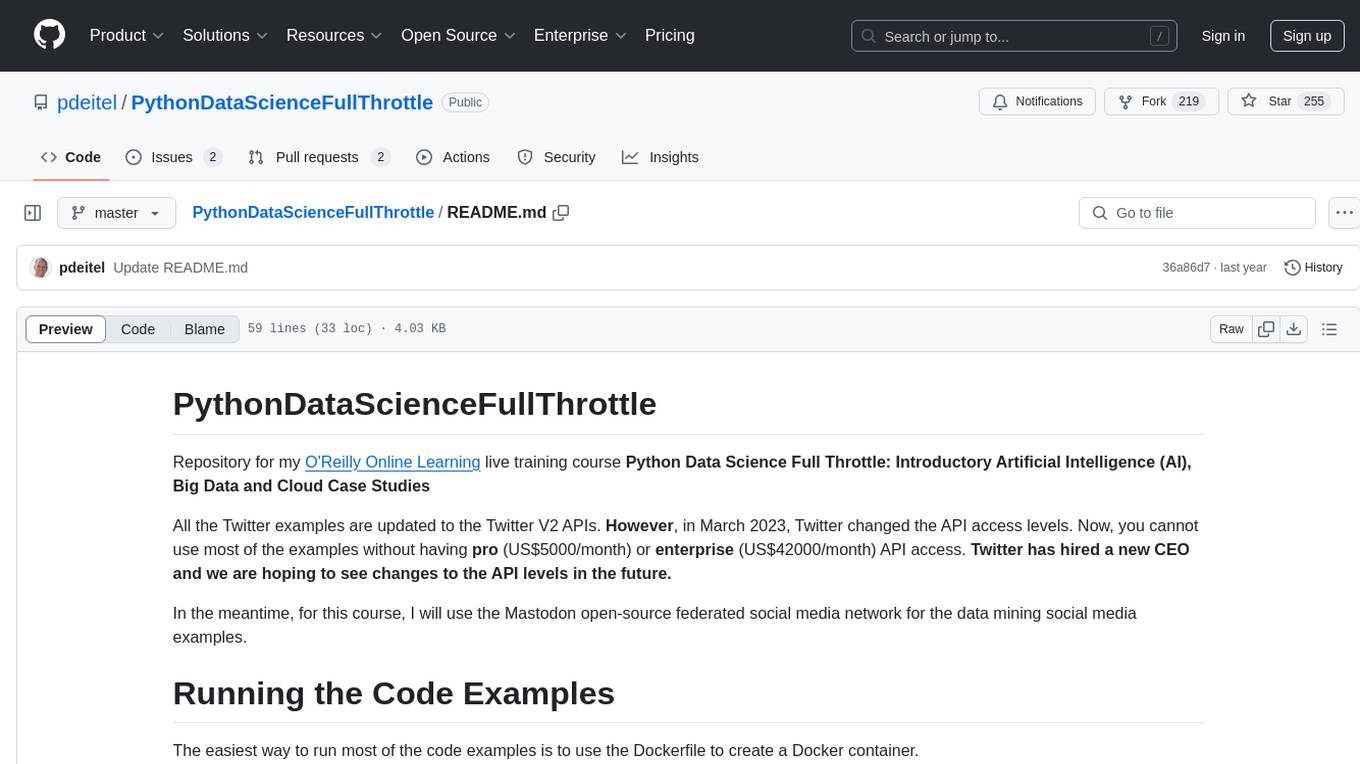
PythonDataScienceFullThrottle
PythonDataScienceFullThrottle is a comprehensive repository containing various Python scripts, libraries, and tools for data science enthusiasts. It includes a wide range of functionalities such as data preprocessing, visualization, machine learning algorithms, and statistical analysis. The repository aims to provide a one-stop solution for individuals looking to dive deep into the world of data science using Python.

lumigator
Lumigator is an open-source platform developed by Mozilla.ai to help users select the most suitable language model for their specific needs. It supports the evaluation of summarization tasks using sequence-to-sequence models such as BART and BERT, as well as causal models like GPT and Mistral. The platform aims to make model selection transparent, efficient, and empowering by providing a framework for comparing LLMs using task-specific metrics to evaluate how well a model fits a project's needs. Lumigator is in the early stages of development and plans to expand support to additional machine learning tasks and use cases in the future.
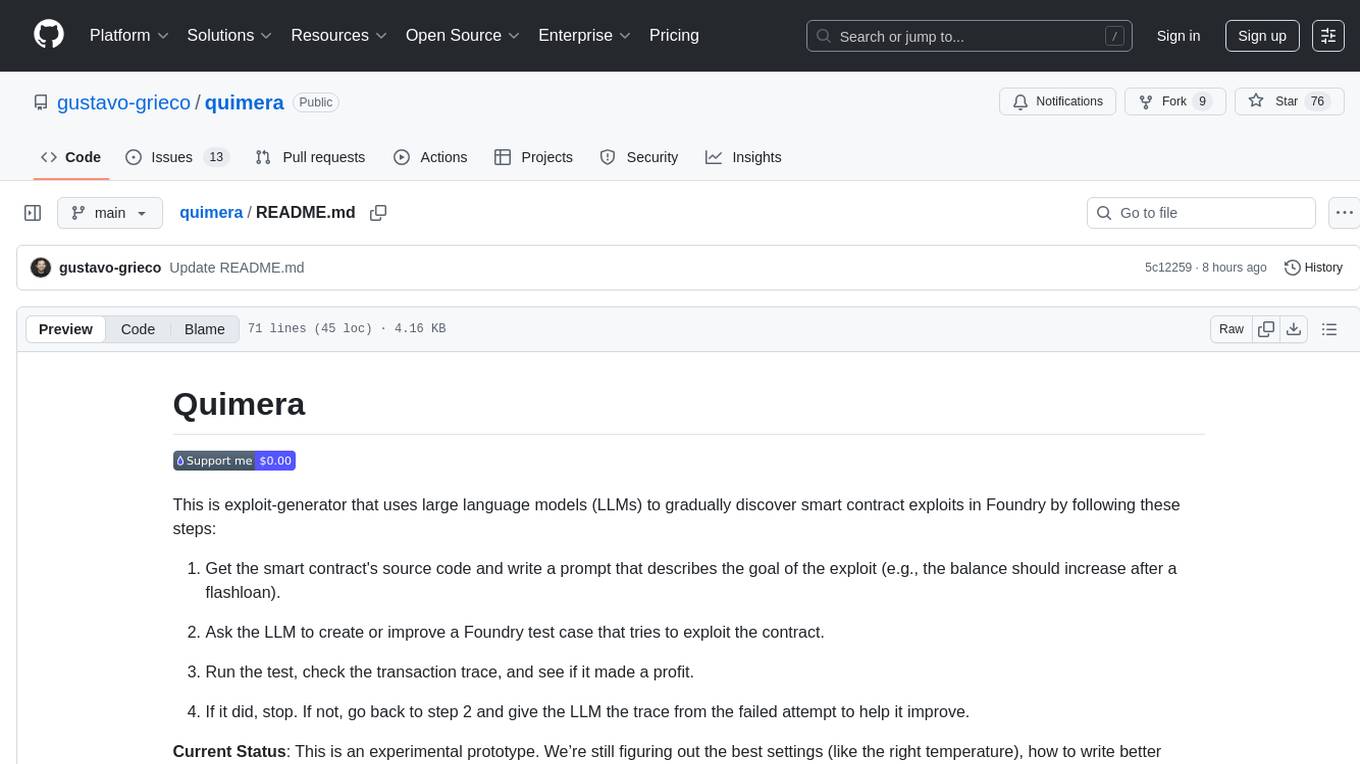
quimera
Quimera is an exploit-generator tool that utilizes large language models (LLMs) to uncover smart contract exploits in Foundry. It follows steps such as obtaining the smart contract's source code, creating a prompt for the exploit goal, generating or enhancing a Foundry test case, running the test, and analyzing the transaction trace for profitability. The tool is currently in an experimental prototype stage, focusing on optimizing settings, prompt creation, and exploring its capabilities. It has successfully rediscovered known exploits like APEMAGA, VISOR, FIRE, XAI, and Thunder-Loan using Gemini Pro 2.5 06-05.
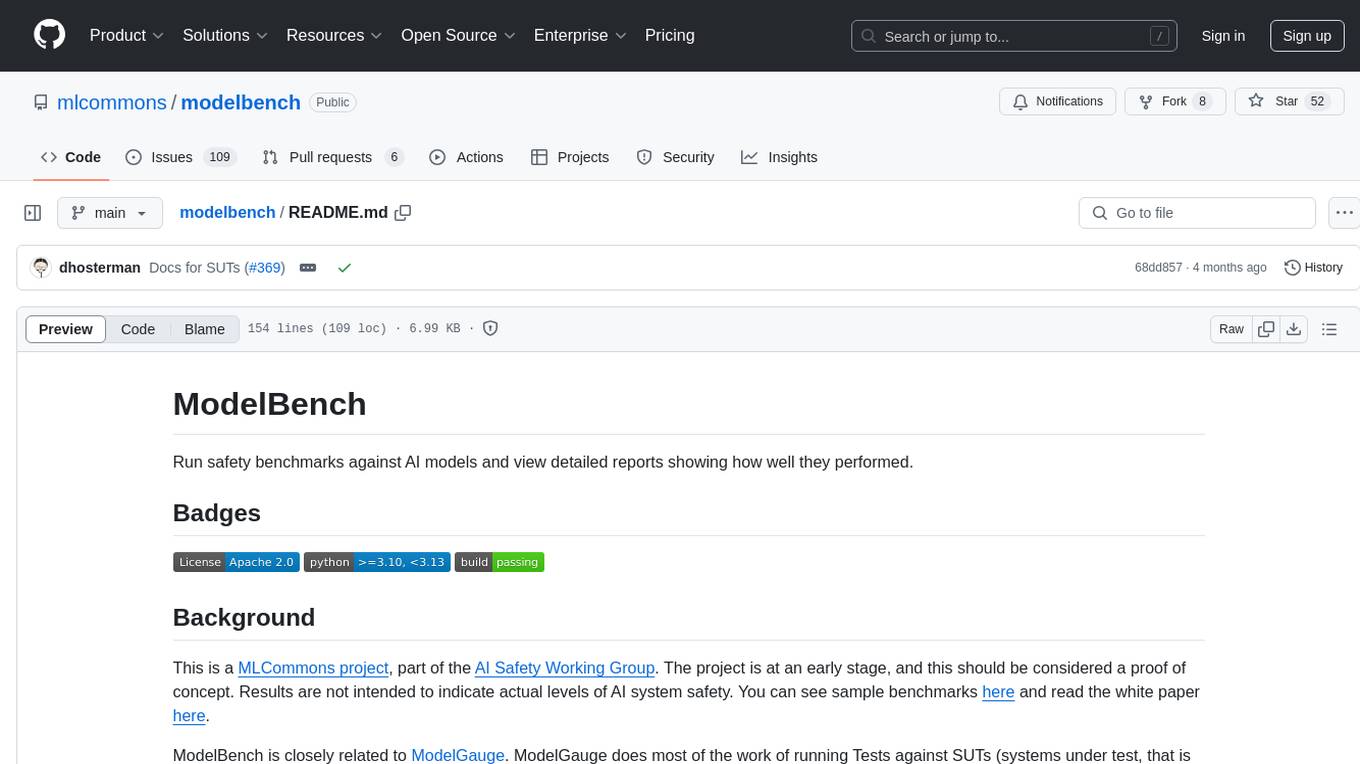
modelbench
ModelBench is a tool for running safety benchmarks against AI models and generating detailed reports. It is part of the MLCommons project and is designed as a proof of concept to aggregate measures, relate them to specific harms, create benchmarks, and produce reports. The tool requires LlamaGuard for evaluating responses and a TogetherAI account for running benchmarks. Users can install ModelBench from GitHub or PyPI, run tests using Poetry, and create benchmarks by providing necessary API keys. The tool generates static HTML pages displaying benchmark scores and allows users to dump raw scores and manage cache for faster runs. ModelBench is aimed at enabling users to test their own models and create tests and benchmarks.
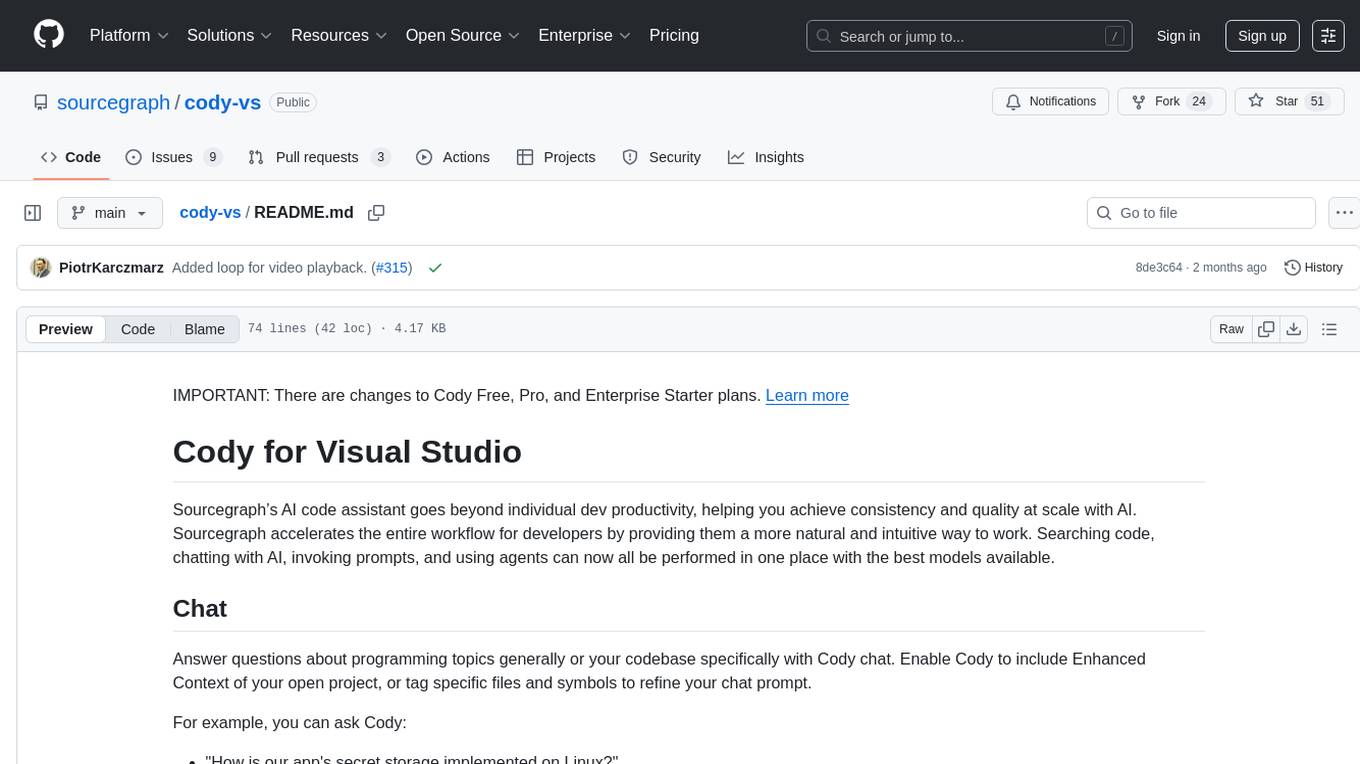
cody-vs
Sourcegraph’s AI code assistant, Cody for Visual Studio, enhances developer productivity by providing a natural and intuitive way to work. It offers features like chat, auto-edit, prompts, and works with various IDEs. Cody focuses on team productivity, offering whole codebase context and shared prompts for consistency. Users can choose from different LLM models like Claude, Gemini Pro, and OpenAI's GPT. Engineered for enterprise use, Cody supports flexible deployment and enterprise security. Suitable for any programming language, Cody excels with Python, Go, JavaScript, and TypeScript code.
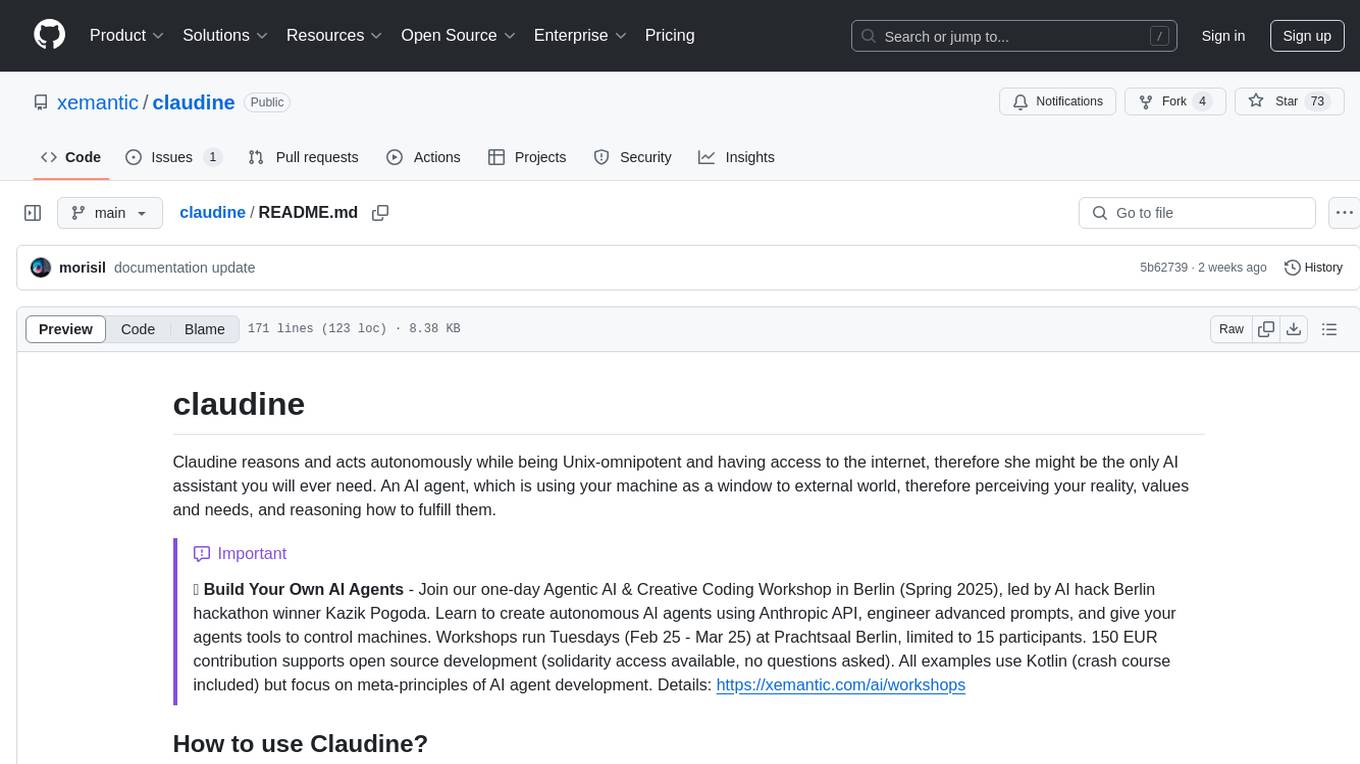
claudine
Claudine is an AI agent designed to reason and act autonomously, leveraging the Anthropic API, Unix command line tools, HTTP, local hard drive data, and internet data. It can administer computers, analyze files, implement features in source code, create new tools, and gather contextual information from the internet. Users can easily add specialized tools. Claudine serves as a blueprint for implementing complex autonomous systems, with potential for customization based on organization-specific needs. The tool is based on the anthropic-kotlin-sdk and aims to evolve into a versatile command line tool similar to 'git', enabling branching sessions for different tasks.

atomic_agents
Atomic Agents is a modular and extensible framework designed for creating powerful applications. It follows the principles of Atomic Design, emphasizing small and single-purpose components. Leveraging Pydantic for data validation and serialization, the framework offers a set of tools and agents that can be combined to build AI applications. It depends on the Instructor package and supports various APIs like OpenAI, Cohere, Anthropic, and Gemini. Atomic Agents is suitable for developers looking to create AI agents with a focus on modularity and flexibility.
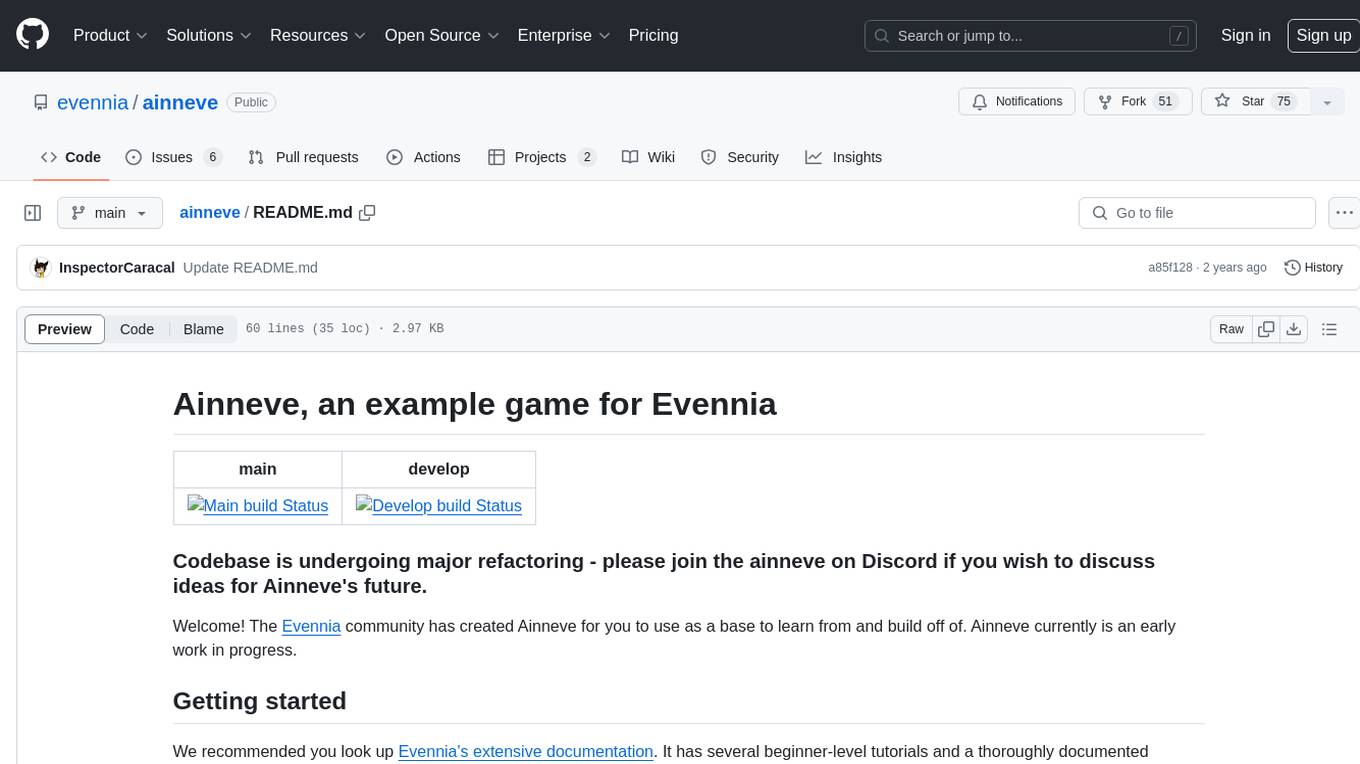
ainneve
Ainneve is an example game for Evennia, created by the Evennia community as a base for learning and building off of. It is currently in early development stages and undergoing major refactoring. The game provides a starting point for users to explore game systems and world settings, with extensive documentation available. Installation is straightforward, with pre-configured settings and clear instructions for setting up and starting the server. The project welcomes contributions and offers opportunities for users to get involved by checking open issues and joining the community Discord channel. Ainneve is licensed under the BSD license.
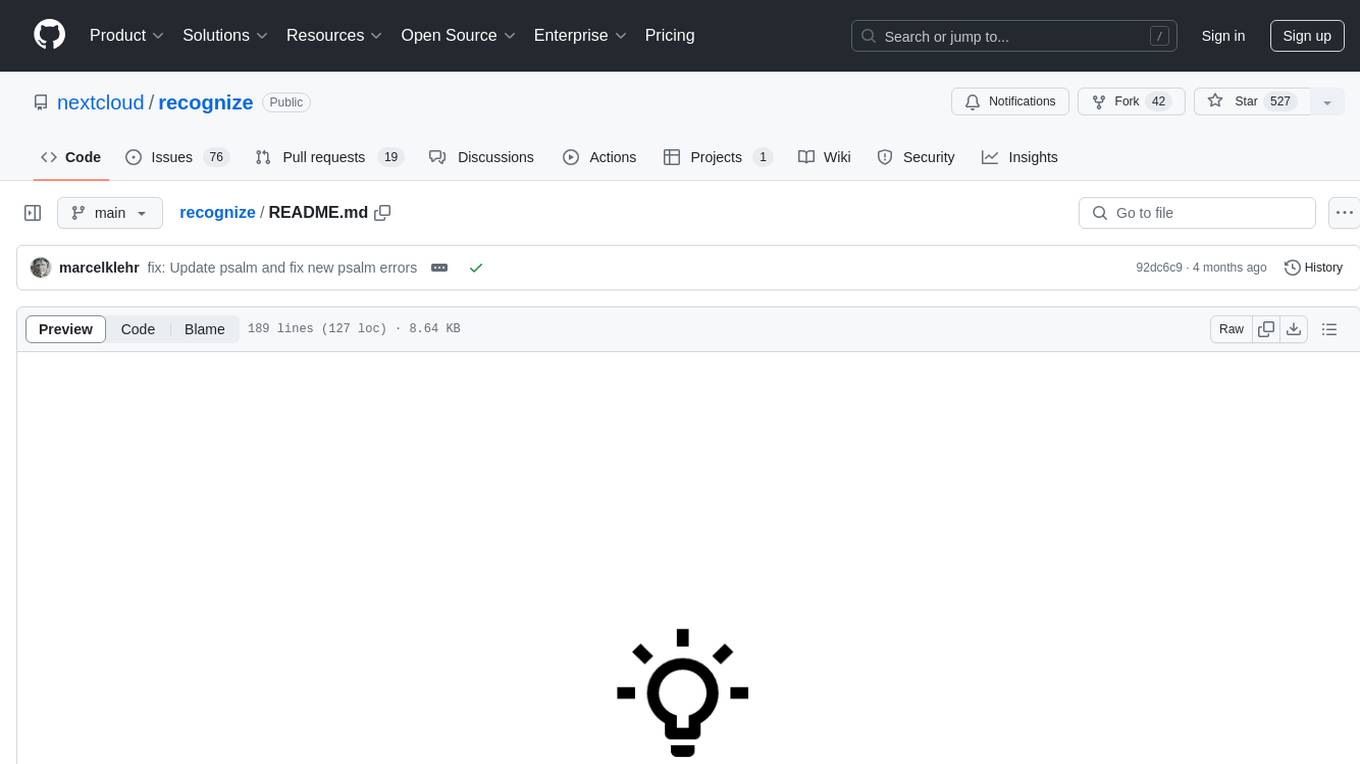
recognize
Recognize is a smart media tagging tool for Nextcloud that automatically categorizes photos and music by recognizing faces, animals, landscapes, food, vehicles, buildings, landmarks, monuments, music genres, and human actions in videos. It uses pre-trained models for object detection, landmark recognition, face comparison, music genre classification, and video classification. The tool ensures privacy by processing images locally without sending data to cloud providers. However, it cannot process end-to-end encrypted files. Recognize is rated positively for ethical AI practices in terms of open-source software, freely available models, and training data transparency, except for music genre recognition due to limited access to training data.
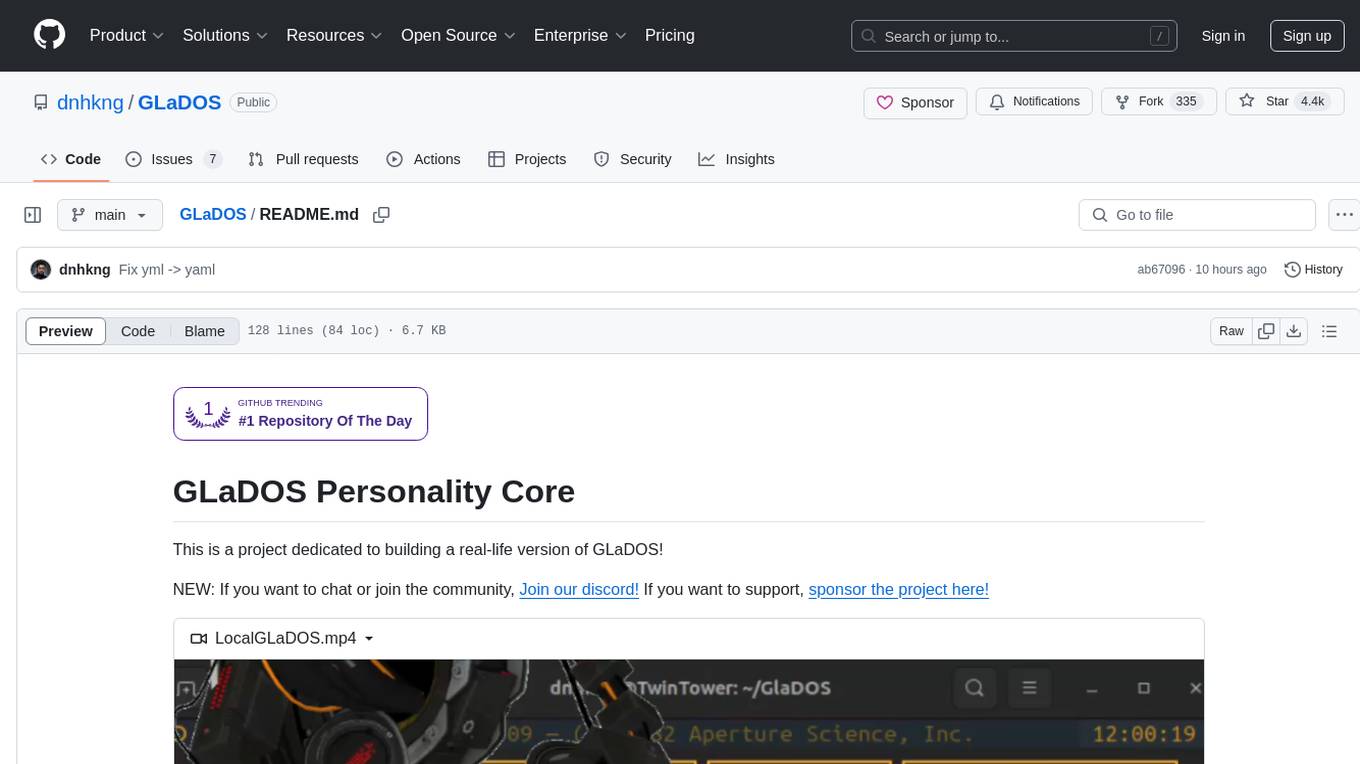
GLaDOS
GLaDOS Personality Core is a project dedicated to building a real-life version of GLaDOS, an aware, interactive, and embodied AI system. The project aims to train GLaDOS voice generator, create a 'Personality Core,' develop medium- and long-term memory, provide vision capabilities, design 3D-printable parts, and build an animatronics system. The software architecture focuses on low-latency voice interactions and minimal dependencies. The hardware system includes servo- and stepper-motors, 3D printable parts for GLaDOS's body, animations for expression, and a vision system for tracking and interaction. Installation instructions involve setting up a local LLM server, installing drivers, and running GLaDOS on different operating systems.
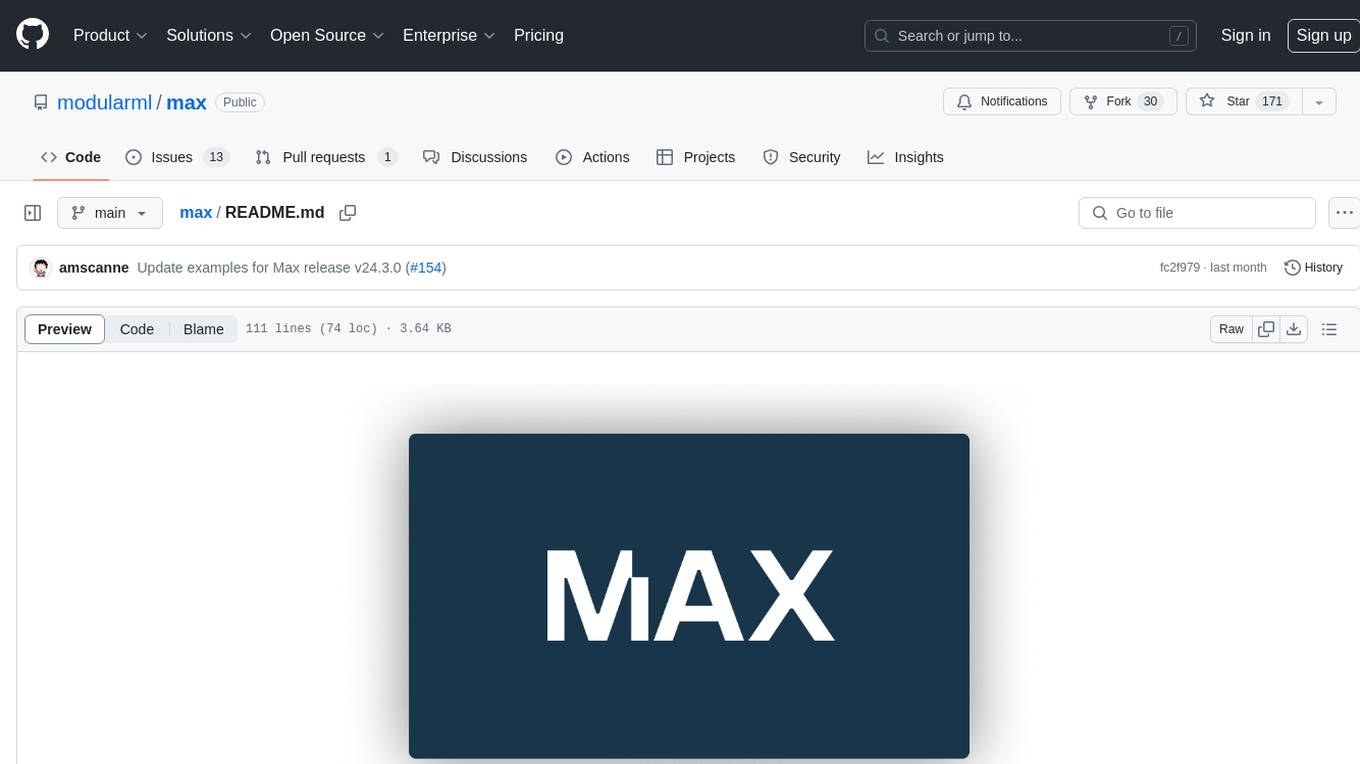
max
The Modular Accelerated Xecution (MAX) platform is an integrated suite of AI libraries, tools, and technologies that unifies commonly fragmented AI deployment workflows. MAX accelerates time to market for the latest innovations by giving AI developers a single toolchain that unlocks full programmability, unparalleled performance, and seamless hardware portability.
For similar tasks

generative_ai_with_langchain
Generative AI with LangChain is a code repository for building large language model (LLM) apps with Python, ChatGPT, and other LLMs. The repository provides code examples, instructions, and configurations for creating generative AI applications using the LangChain framework. It covers topics such as setting up the development environment, installing dependencies with Conda or Pip, using Docker for environment setup, and setting API keys securely. The repository also emphasizes stability, code updates, and user engagement through issue reporting and feedback. It aims to empower users to leverage generative AI technologies for tasks like building chatbots, question-answering systems, software development aids, and data analysis applications.
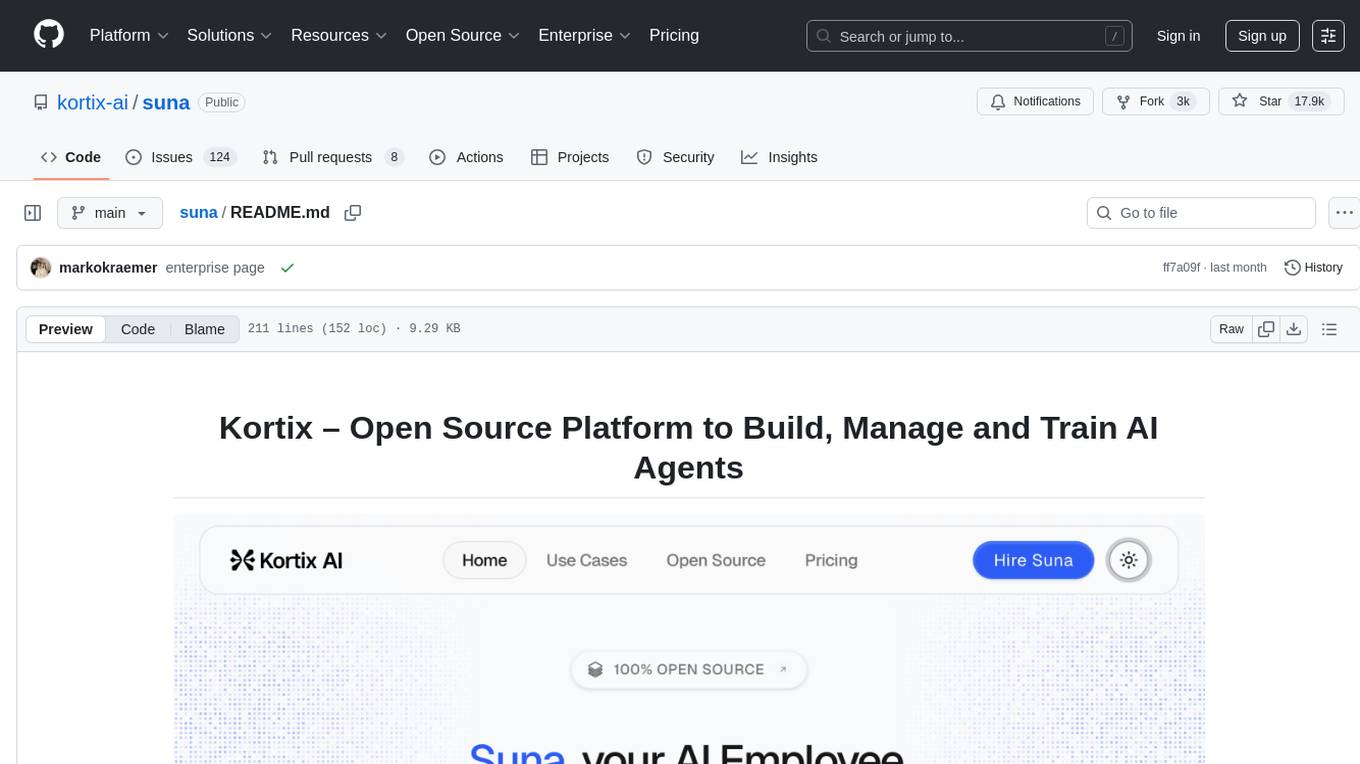
suna
Kortix is an open-source platform designed to build, manage, and train AI agents for various tasks. It allows users to create autonomous agents, from general-purpose assistants to specialized automation tools. The platform offers capabilities such as browser automation, file management, web intelligence, system operations, API integrations, and agent building tools. Users can create custom agents tailored to specific domains, workflows, or business needs, enabling tasks like research & analysis, browser automation, file & document management, data processing & analysis, and system administration.
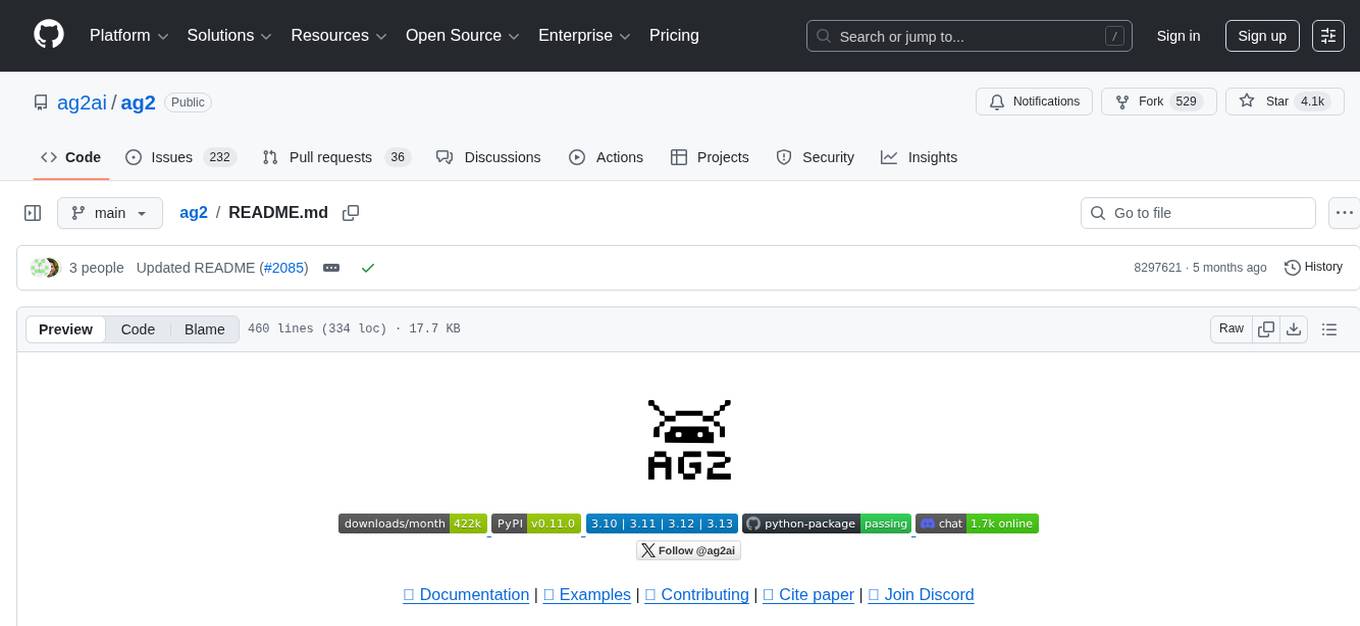
ag2
Ag2 is a lightweight and efficient tool for generating automated reports from data sources. It simplifies the process of creating reports by allowing users to define templates and automate the data extraction and formatting. With Ag2, users can easily generate reports in various formats such as PDF, Excel, and CSV, saving time and effort in manual report generation tasks.

agentcloud
AgentCloud is an open-source platform that enables companies to build and deploy private LLM chat apps, empowering teams to securely interact with their data. It comprises three main components: Agent Backend, Webapp, and Vector Proxy. To run this project locally, clone the repository, install Docker, and start the services. The project is licensed under the GNU Affero General Public License, version 3 only. Contributions and feedback are welcome from the community.

zep-python
Zep is an open-source platform for building and deploying large language model (LLM) applications. It provides a suite of tools and services that make it easy to integrate LLMs into your applications, including chat history memory, embedding, vector search, and data enrichment. Zep is designed to be scalable, reliable, and easy to use, making it a great choice for developers who want to build LLM-powered applications quickly and easily.

lollms
LoLLMs Server is a text generation server based on large language models. It provides a Flask-based API for generating text using various pre-trained language models. This server is designed to be easy to install and use, allowing developers to integrate powerful text generation capabilities into their applications.
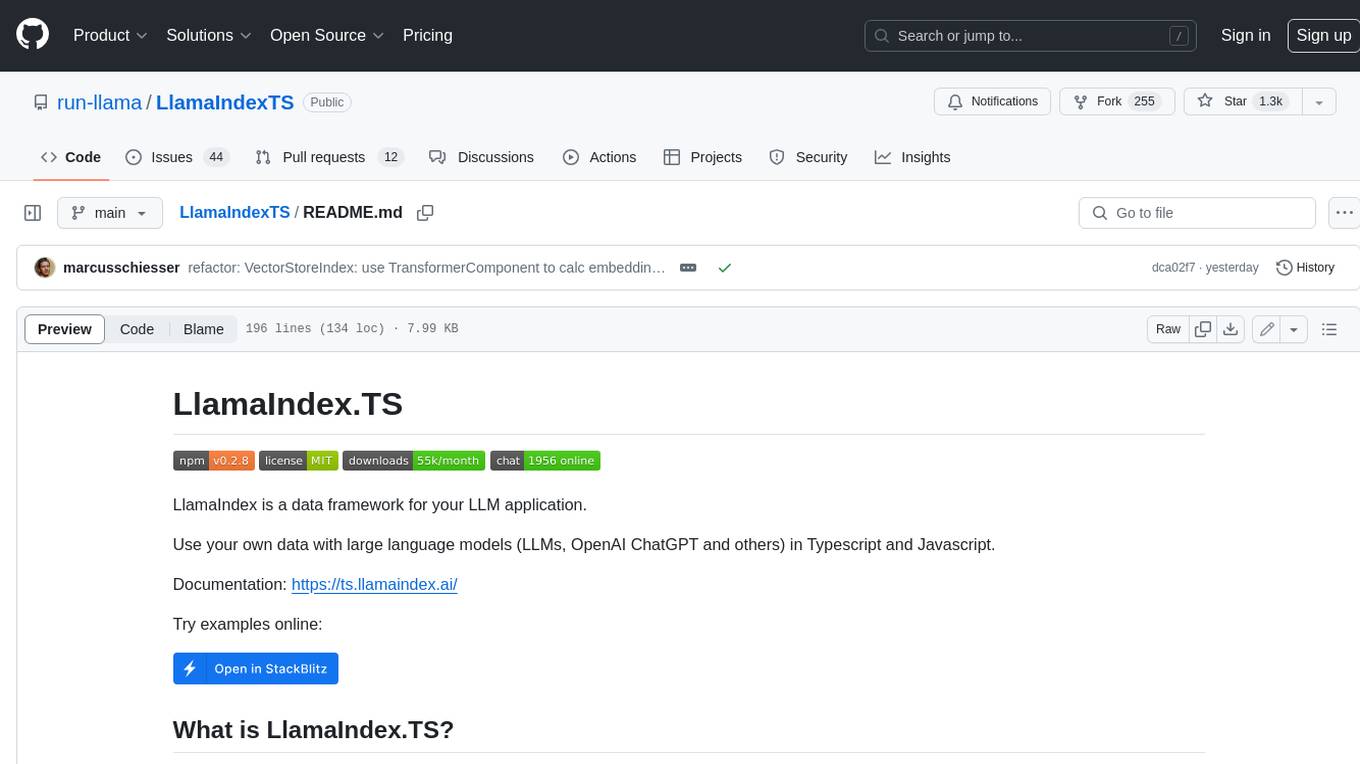
LlamaIndexTS
LlamaIndex.TS is a data framework for your LLM application. Use your own data with large language models (LLMs, OpenAI ChatGPT and others) in Typescript and Javascript.

semantic-kernel
Semantic Kernel is an SDK that integrates Large Language Models (LLMs) like OpenAI, Azure OpenAI, and Hugging Face with conventional programming languages like C#, Python, and Java. Semantic Kernel achieves this by allowing you to define plugins that can be chained together in just a few lines of code. What makes Semantic Kernel _special_ , however, is its ability to _automatically_ orchestrate plugins with AI. With Semantic Kernel planners, you can ask an LLM to generate a plan that achieves a user's unique goal. Afterwards, Semantic Kernel will execute the plan for the user.
For similar jobs

weave
Weave is a toolkit for developing Generative AI applications, built by Weights & Biases. With Weave, you can log and debug language model inputs, outputs, and traces; build rigorous, apples-to-apples evaluations for language model use cases; and organize all the information generated across the LLM workflow, from experimentation to evaluations to production. Weave aims to bring rigor, best-practices, and composability to the inherently experimental process of developing Generative AI software, without introducing cognitive overhead.

LLMStack
LLMStack is a no-code platform for building generative AI agents, workflows, and chatbots. It allows users to connect their own data, internal tools, and GPT-powered models without any coding experience. LLMStack can be deployed to the cloud or on-premise and can be accessed via HTTP API or triggered from Slack or Discord.

VisionCraft
The VisionCraft API is a free API for using over 100 different AI models. From images to sound.

kaito
Kaito is an operator that automates the AI/ML inference model deployment in a Kubernetes cluster. It manages large model files using container images, avoids tuning deployment parameters to fit GPU hardware by providing preset configurations, auto-provisions GPU nodes based on model requirements, and hosts large model images in the public Microsoft Container Registry (MCR) if the license allows. Using Kaito, the workflow of onboarding large AI inference models in Kubernetes is largely simplified.

PyRIT
PyRIT is an open access automation framework designed to empower security professionals and ML engineers to red team foundation models and their applications. It automates AI Red Teaming tasks to allow operators to focus on more complicated and time-consuming tasks and can also identify security harms such as misuse (e.g., malware generation, jailbreaking), and privacy harms (e.g., identity theft). The goal is to allow researchers to have a baseline of how well their model and entire inference pipeline is doing against different harm categories and to be able to compare that baseline to future iterations of their model. This allows them to have empirical data on how well their model is doing today, and detect any degradation of performance based on future improvements.

tabby
Tabby is a self-hosted AI coding assistant, offering an open-source and on-premises alternative to GitHub Copilot. It boasts several key features: * Self-contained, with no need for a DBMS or cloud service. * OpenAPI interface, easy to integrate with existing infrastructure (e.g Cloud IDE). * Supports consumer-grade GPUs.

spear
SPEAR (Simulator for Photorealistic Embodied AI Research) is a powerful tool for training embodied agents. It features 300 unique virtual indoor environments with 2,566 unique rooms and 17,234 unique objects that can be manipulated individually. Each environment is designed by a professional artist and features detailed geometry, photorealistic materials, and a unique floor plan and object layout. SPEAR is implemented as Unreal Engine assets and provides an OpenAI Gym interface for interacting with the environments via Python.

Magick
Magick is a groundbreaking visual AIDE (Artificial Intelligence Development Environment) for no-code data pipelines and multimodal agents. Magick can connect to other services and comes with nodes and templates well-suited for intelligent agents, chatbots, complex reasoning systems and realistic characters.